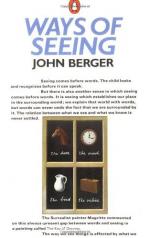
|
| Name: _________________________ | Period: ___________________ |
This quiz consists of 5 multiple choice and 5 short answer questions through Chapter 7.
Multiple Choice Questions
1. Which statement is NOT true about viewing an image made in the past?
(a) A work of art mystifies one about the past.
(b) Images show a sight that is not presently available.
(c) A viewer "sees" himself in the landscape he looks at.
(d) Images from the past are made clear with a modern understaning of events.
2. What is typically the focus in a work of art displaying a nude?
(a) A male figure and female figure without clothing.
(b) A female figure undressing for the male viewer.
(c) A dressed male figure viewing the figure of a naked woman.
(d) A naked female ignoring the unknown viewer.
3. Which phrase best describes publicity?
(a) A tool used by capitalism.
(b) A type of artwork.
(c) A finely crafted message to artists.
(d) Images used to promote individual choice and freedom.
4. Which of the following statements is NOT true about publicity images, according to Berger et al.?
(a) They address the present.
(b) They always point to the future.
(c) They use the past to point to the future.
(d) They do not address the present.
5. According to Berger et al., why does a consumer society need publicity images?
(a) To create variety in numbers and types of products.
(b) To develop its culture and beliefs.
(c) To develop the economy.
(d) To create more jobs in art areas.
Short Answer Questions
1. What are most traditional oil paintings commissioned to demonstrate to the viewer?
2. Which is an example of a nude painting discussed by Berger et al.?
3. How do publicity images provide reassurance for one's choices?
4. How is Rembrandt portrayed in his second self-portrait?
5. What does Couture's painting "A Roman Feast" display?
|
This section contains 408 words (approx. 2 pages at 300 words per page) |

|




